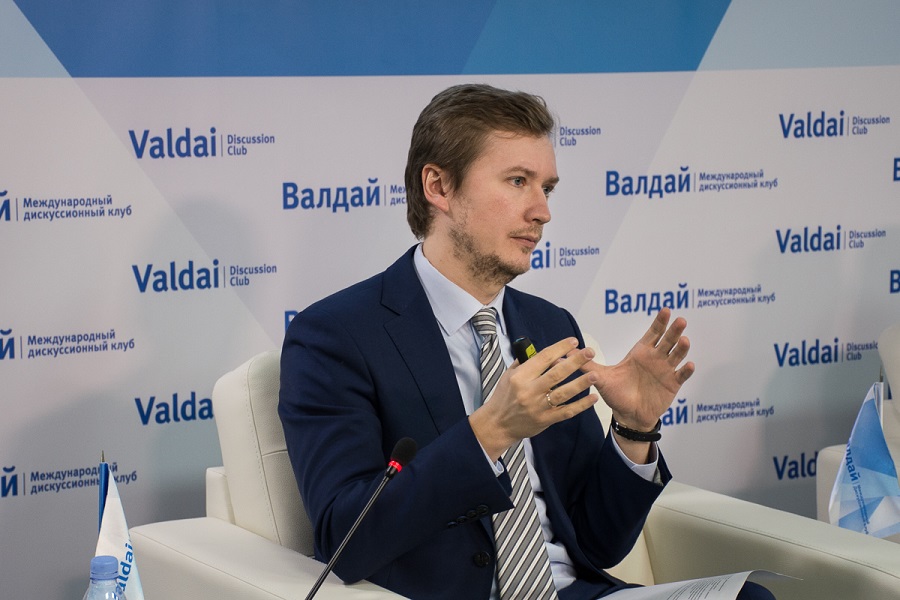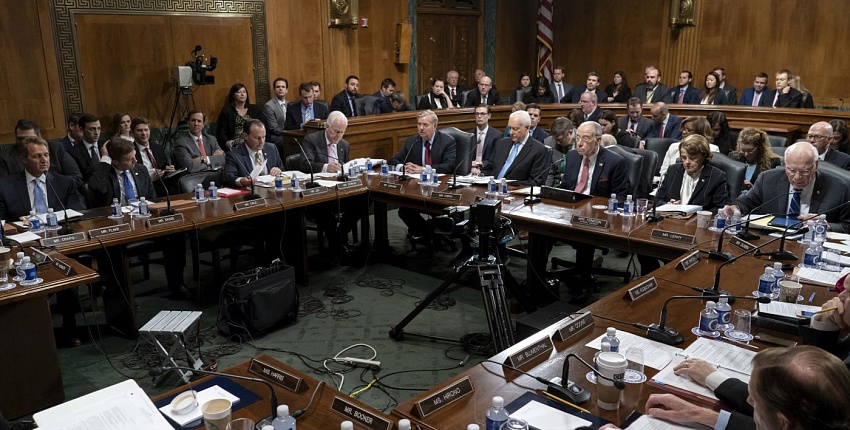Why Doesn't Russia Have a Lobby In The United States?
By Aliheydar_Rzayev Wednesday, 16 May 2018 1:24 AM

Andrey Sushentsov, the Valdai Club Foundation's program director, wrote an article, titled "Why Doesn't Russia Have a Lobby In The United States?" Sushenstov is an expert on American foreign policy and has previously served as a visiting professor at Georgetown, Johns Hopkins and Harvard.
In the article, Sushentsov argued that the ballyhooed Russian influence in the U.S. is a myth, contrary to what the American media believes. Sushentsov then suggested that it is time for Russia to have an above board Russian lobby in the U.S. that can submit columns to the leading media outlets, articles for the analytical press, organize speeches at universities and think tanks, and respond to informal questions from congressional staffs and executive government bodies.
Sushentsov added that the Americans are engaged in a "witch-hunt," against Russian influence, because they regard secret Russian influence as indecent and suspect it of pursuing selfish aims. "Under the circumstances, it is necessary to put aside the secrecy and make Russian presence and influence obvious," wrote the Russia scholar.
Below are excerpts from Sushentsov's article
 'We must start to exert constructive influence on U.S. policy'
'We must start to exert constructive influence on U.S. policy'
"This may be an unpopular approach, but we must start to exert constructive influence on U.S. policy for the sake of stability and predictability in relations with the U.S.
"Moscow should aim at continuously taking part in American foreign policy disputes to create an atmosphere of common sense in discussing Russia-related issues. This task is not yet set despite a solid list of Russian organizations that are working through expert and humanitarian contact.
"As a result, there is no respectable voice from Russia, the voice of a respected and accepted professional in U.S. foreign policy discussion. Publications by [director of the Carnegie Moscow Center] Dmitry Trenin and [editor-in-chief of Russia in Global Affairs magazine] Fyodor Lukyanov are a rare example of the efforts in this area. Publications by other Russian authors in the U.S. analytical press are scarce. Russian speakers have appeared at Congressional hearings very rarely and these were critics of the Russian government for the most part.
"You might object to this approach by saying that the U.S. won't accept us, won't listen to us and will never heed to us. In reality, the Americans are ignoring weak arguments and overt propaganda. They have a well-established tradition of mistrusting their government. However, sound arguments will always find an audience and those who are dubious ask questions. Therefore, it is important to make an effort with this approach. Even if the current administration cannot be persuaded, it is possible to sow doubt among experts and in society, thereby complicating the adoption of an awkward decision.
"There is obviously a demand for a second opinion from Russian speakers in the U.S., but this should be a constructive voice that will reveal the motives of Russian actions without reproach and with reliance on empathy and common sense. But how many Russian speakers do we have in Russia that can convincingly address a critical environment in acceptable English, with competence and an understanding of U.S. mentality? There have been successes in this area -- for instance, President Vladimir Putin's article in The New York Times 'A Plea For Caution From Russia' with a warning not to launch attacks on Syria in 2013. However, such articles are rare and do little to change the overall picture.
"Confrontation has become the new format for Russia-U.S. relations. Apparently, this new systemic condition will be in place for the foreseeable future. But even in this context it makes no sense to give the U.S. media complete control in creating our image. The press does not have a vivid imagination so a common Russian metaphor will be used, such as President Putin or, with the same frequency, Russian philosopher Alexander Dugin. Dugin's image meets the smoldering apprehensions of the American people of Russians as under-the-table manipulators and effective expansionists. In a way, in U.S. mentality, Dugin is a kind of a new Grigory Rasputin who changes the course of events through covert knowledge. The second widespread metaphor is the image of 'a righteous Russia' that is 'back on track.' Most often it is personified by some Pavlik Morozov who reports on his father out of ideological motives. Obviously, neither image corresponds to reality. But why is there no urgency to clarify the situation?
'The formation of a Russian lobby in the U.S. is primarily an intellectual challenge'
"The formation of a Russian lobby in the U.S. is primarily an intellectual challenge. The Russian elite finds it hard to believe that U.S. policy is competitive, that its outcome is not preset, that a real foreign policy discussion is taking place, and that polemics in society, the press and Congress are not a well-orchestrated performance. Many are surprised that even the U.S. government is trying to win the press over to a cause. Thus, before making unpopular decisions the George Bush administration mobilized its cabinet to persuade public opinion and Congress on the need to invade Iraq, for example. As for the Donald Trump presidency, it is one big media campaign altogether.
"Second, Russia does not believe that U.S. ideology is a key motive behind U.S. actions. Post-Soviet Russians have lost all faith in ideology whereas, to the contrary, most Americans sincerely believe in its effectiveness.
"Third, the Russian elite believes that a lobby will violate U.S. sovereignty. Since we do not want the Americans to lobby their ideas in the Russian Parliament, we wouldn't do it in the U.S. One reason for this perception is that, as distinct from their European, Turkish, Israeli or Chinese counterparts, Russia's elite hasn't studied in the U.S., do not have well-established contacts and access to the American establishment.
"In other words, it is necessary to establish an affiliate of the Russian analytical center in Washington or a research institute for continuous participation in U.S. foreign policy discussion. This center should submit columns to the leading media, articles for the analytical press, organize speeches at universities and think tanks, attend secular events in the capital, mix with politically active circles, consult editorial boards at leading media outlets, and respond to informal questions from Congressional staffs and executive government bodies. It is important that this center is legalized under U.S. law and that any contact with Russian analysts is not perceived as compromising.
"The organization of this center will not be a huge financial burden but is capable of greatly reducing the damage from sanctions. The Americans are engaged in witch-hunt because they are afraid of secret Russian influence as indecent and pursuing selfish aims. Under the circumstances, it is necessary to put aside the secrecy and make Russian presence and influence obvious. The appearance of a respectable and calm Russia against a sarcastic, denouncing and irreconcilable Russia could improve the perceptions of this country in the U.S. and the rest of the world. Even Russia's allies often rely on Russia's image in the U.S. mainstream. It is time we returned the right to create it ourselves."




























Add new comment